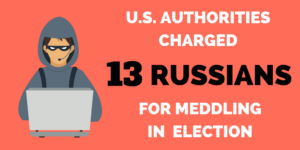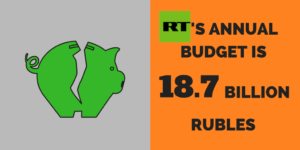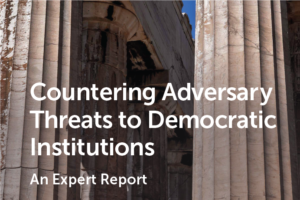
eu vs disinfo
One hour after news broke about the school shooting in Florida last week, Twitter accounts suspected of having links to Russia released hundreds of posts taking up the gun control debate, The New York Times reports:
Those automated Twitter accounts have been closely tracked by researchers. Last year, the Alliance for Securing Democracy, in conjunction with the German Marshall Fund, a public policy research group in Washington, created a website that tracks hundreds of Twitter accounts of human users and suspected bots that they have linked to a Russian influence campaign.
“This is pretty typical for them, to hop on breaking news like this,” said Jonathon Morgan, chief executive of New Knowledge, a company that tracks online disinformation campaigns. “The bots focus on anything that is divisive for Americans. Almost systematically.”

RFE/RL
The Russian assault on America’s democracy and other Western democracies is real, notes Daniel Fried (right), a career diplomat under presidents of both parties, a distinguished fellow at the Atlantic Council and a board member of the National Endowment for Democracy. At least parts of Trump’s administration recognize the problem. On Saturday at the Munich Security Conference, H.R. McMaster, his national security adviser, said that the evidence of Russia’s election interference “is now really incontrovertible.” ….Under proper presidential leadership, what would a policy to fight back look like? Fried asks in The Atlantic:
It could include taking criminal action against Russian bad actors, including those interfering in American elections, and bringing sanctions against bad cyber hackers and actors and their patrons and funders—or even against the entire Russian cyber sector. Using information from the Kremlin report, sanctions could go after Putin and his inner circle. A campaign to expose dark Russian money coming into the United States—similar to America’s post-9/11 efforts against terrorist finance—could also make a big difference. Another vital piece of these efforts: bringing together government actors, social media companies, and civil society groups, to identify Russian disinformation and constrict the space in which it operates.
 Russia’s attempts to undermine US democracy have been described as another 9/11, by some observers.
Russia’s attempts to undermine US democracy have been described as another 9/11, by some observers.
The U.S., however, should not copy the Kremlin’s influence operations approach on Russians, argues analyst Clint Watts. Stealing and releasing the personal information of hundreds or thousands of Russians, invading their social media platform VKontakte with false Russian personas, or spreading false information to malign Russian leaders undermines the democratic principles America stands for, he writes for The Daily Beast:
Instead, the U.S. should focus on two avenues of counterattack: oligarchs and activists. Russia’s oligarchs who rule the kleptocratic society can only enjoy their wealth if part of the international system. Instituting further sanctions on Russia and in particular those tied to the government places pressure on President Putin, who must appease those who suddenly have limited reach due to his pursuit of international power at their expense.

EU VS DISINFO
A sobering paper published in the Strategic Studies Quarterly explains how propagandists manipulate social media in their cyberwars against the United States. Hostile forces, employing automated bots, leverage the blind spots and biases of unwitting Americans to help them send falsehoods flying to spread division and demoralization, The Washington Post’s David Von Drehle writes:
 In his paper, “Commanding the Trend: Social Media as Information Warfare,” Lt. Col. Jarred Prier examines strategies and tactics used by both the Islamic State and the Russian government to seize command of trending topics on Twitter and, to a lesser degree, Facebook. By hijacking these algorithms, enemy agents and their armies of bots inflame tension and erode trust across American society.
In his paper, “Commanding the Trend: Social Media as Information Warfare,” Lt. Col. Jarred Prier examines strategies and tactics used by both the Islamic State and the Russian government to seize command of trending topics on Twitter and, to a lesser degree, Facebook. By hijacking these algorithms, enemy agents and their armies of bots inflame tension and erode trust across American society.
The celebrated analyst Jacques Ellul noted that democracies were prone to having problems with outward communication through propaganda, Prier observes:
Because democracies rely on presenting an image of fairness and truth, “propaganda made by democracies is ineffective, paralyzed, mediocre.” The United States was ill equipped to combat Soviet active measures during the Cold War, and it remains unable to compete using social media as an influence operation.
 Countering Adversary Threats to Democratic Institutions, a report from a bipartisan Experts Group at CSIS calls for a whole-of-nation strategy to address the threat to, and improve the resilience of, the country’s democratic institutions.
Countering Adversary Threats to Democratic Institutions, a report from a bipartisan Experts Group at CSIS calls for a whole-of-nation strategy to address the threat to, and improve the resilience of, the country’s democratic institutions.
“What is needed is a national approach that pulls together governments, at all levels in the United States and with like-minded nations around the globe, along with civil society, academia, technology companies, and the public,” according to the report – part of CSIS’s new project Defending Democratic Institutions:
- First, it outlines the nature of the threat posed by the Russian government, building upon what Russia has done in other countries, as well as in the United States.
- The second section describes how technology has magnified this threat.
- The third section examines essential elements of a “National Strategy to Counter Russian and Other Foreign Adversary Threats to Democratic Institutions.”
- The final section is a call for action.
 The Alliance for Securing Democracy hosted a roundtable at the Munich Security Conference focused on concrete ways to build a transatlantic response. Former Estonian President Toomas Ilves, former Secretary of Homeland Security Michael Chertoff, and former Deputy National Security Advisor to Vice President Biden Julie Smith — all ASD Advisory Council members, led a candid discussion on “The Foreign Interference Challenge: Closing Democracies’ Vulnerability Gap” focused on sharing lessons learned in the protecting democracies from foreign interference.
The Alliance for Securing Democracy hosted a roundtable at the Munich Security Conference focused on concrete ways to build a transatlantic response. Former Estonian President Toomas Ilves, former Secretary of Homeland Security Michael Chertoff, and former Deputy National Security Advisor to Vice President Biden Julie Smith — all ASD Advisory Council members, led a candid discussion on “The Foreign Interference Challenge: Closing Democracies’ Vulnerability Gap” focused on sharing lessons learned in the protecting democracies from foreign interference.
 Despite what is now overwhelming evidence of Russian involvement in the last U.S. presidential election, no one at the highest level of the U.S. government has made a significant commitment to prevent Russian involvement in the next election, or the next debate, or the next national argument, either, analyst Anne Applebaum writes for The Washington Post.
Despite what is now overwhelming evidence of Russian involvement in the last U.S. presidential election, no one at the highest level of the U.S. government has made a significant commitment to prevent Russian involvement in the next election, or the next debate, or the next national argument, either, analyst Anne Applebaum writes for The Washington Post.
There is plenty of evidence now that the very nature of the platforms encourages ever more extreme, ever more offensive material, adds Applebaum, a board member of the National Endowment for Democracy. Studies of YouTube have shown how automated video production, governed by algorithms, not humans, leads inexorably to more violent and more disturbing videos, she writes for the Post:
One recent survey suggests that up to 15 percent of Twitter accounts — some 48 million — may not be human at all. Many think that is a gross underestimate. Don’t let them off the hook: Until they take responsibility for what appears on their platforms — or until they are held legally liable — the social media companies will continue to fuel the division that Goldman piously denounces. They are not accidental victims of Russia’s information war. They are its tools.

Just as Sept. 11 made clear that private security could not safeguard the aviation system, so the 2016 Russian attack made clear that social media companies cannot safeguard the electoral system, argues Max Boot, the Jeane J. Kirkpatrick senior fellow for national security studies at the Council on Foreign Relations.
Companies like Facebook and Twitter could develop technology to weed out attempts at political disinformation—tools powered, perhaps, by the very same advanced algorithmic tools that enabled disinformation to spread on their platforms in the first place, say analysts DIPAYAN GHOSH, a fellow at New America and the Shorenstein Center at the Harvard Kennedy School, and BEN SCOTT, a senior advisor at New America. But in the longer term, this is a problem of market power, they argue in The Atlantic:
Experts would do well to call for limits on the vast amounts of data available to a digital-advertising industry dominated by social-media and internet-platform companies by enforcing comprehensive privacy reforms. All of this demands a more concerted effort to curb the immense concentration of power enjoyed by the largest internet-platform companies.
 Report Launch: Democratic Defense Against Disinformation
Report Launch: Democratic Defense Against Disinformation
March 7, 2018 9:00 am
Washington, DC
Please join the Atlantic Council for the launch of its report, Democratic Defense Against Disinformation on Wednesday, March 7, 2018 from 9:00 a.m. to 10:30 a.m. at the Atlantic Council Headquarters (1030 15th Street NW, 12th Floor, West Tower Elevators).







